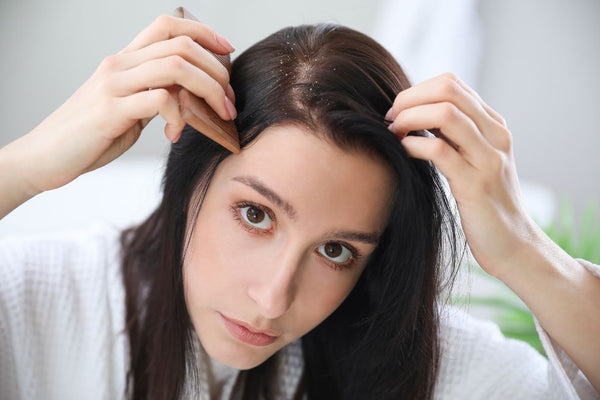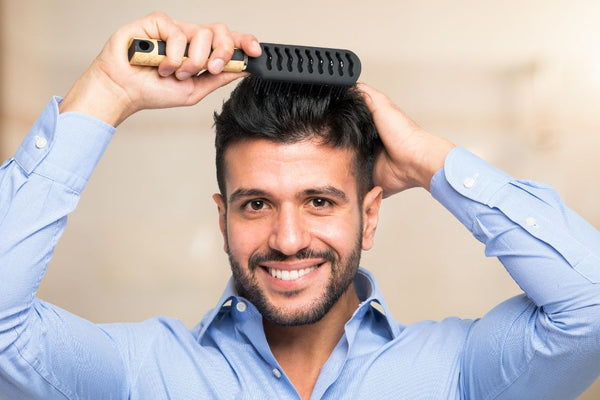Dandruff isn’t just pesky white flakes that you notice on your hair. It’s often associated with concerns about hair loss. In this blog, we will explore the question, "Can dandruff cause hair loss?" and provide insights into the relationship between these two conditions. Also, we'll look at the effective ways to manage and prevent these issues.
Dandruff, characterized by the shedding of dead skin cells from the scalp, isn’t solely a hygiene-related problem; it indicates an imbalanced scalp. The correlation between dandruff and hair loss is significant, necessitating a comprehensive approach to tackle both issues for a healthier scalp and better hair. In this blog, we'll look at four ways dandruff can cause hair loss and discuss practical treatments to help keep your scalp healthy and thick hair.
Understanding the Link Between Dandruff and Hair Loss
Dandruff isn’t a one-size-fits-all condition. It can stem from various causes, including fungal overgrowth, oily skin, sensitivity to hair products, or underlying skin conditions. Understanding the underlying cause is crucial for effective treatment. It can manifest as dry flakes or as a more severe form characterized by red, scaly, and itchy scalp patches.
So, the main question here is, does dandruff cause hair loss?
No, dandruff doesn't directly cause hair loss, but it can contribute to hair fall. The relationship between dandruff and hair loss is complex. When dandruff is severe and left untreated, it can lead to scalp inflammation and itching. Persistent dandruff weakens hair follicles, leading to increased hair fall. Additionally, continuous scratching of the scalp to relieve itching caused by dandruff can damage hair strands, leading to hair loss.
How Can Dandruff Cause Hair Loss?
Dandruff can create conditions that contribute to hair shedding. The connection between dandruff and hair loss lies in how dandruff affects scalp health. Here's how dandruff can indirectly lead to hair loss:
1. Inflammation and Irritation
Dandruff, those white flakes you see on your scalp, can lead to hair loss through inflammation and irritation. When dandruff builds up, it can make your scalp itchy and red. The constant irritation damages the hair follicles, the tiny pockets in the skin where hair grows. When the hair follicles become inflamed, it disrupts the normal hair growth cycle. Eventually, this inflammation can weaken the hair roots and lead to excessive shedding or hair loss.
How scalp inflammation cause hair loss. Find out.
2. Scratching and Traction
Dandruff can make your scalp itchy and flaky, which can cause you to scratch frequently. The constant scratching and rubbing of the scalp can physically damage the hair follicles over time. The friction and pulling on the hair strands from excessive scratching can also weaken the hair roots and lead to increased hair shedding or breakage. Additionally, the traction or pulling force from repeatedly running your fingers through your hair to remove flakes can further contribute to hair loss.
3. Underlying Conditions
Dandruff, sometimes is a symptom of an underlying skin condition like seborrheic dermatitis or psoriasis, which can contribute to hair loss. It indirectly affects the scalp's health and hair follicles.
4. Microbial Factors
Dandruff is often linked with overgrowth of a yeast like fungus called Malassezia. While it’s a normal part of the scalp’s microbiome, an overgrowth might trigger scalp issues, indirectly causing hair problems like hair thinning and hair loss.
What Causes Dandruff in Your Hair?
Understanding the causes of dandruff can help you to treat dandruff-related hair loss. There are several factors that can contribute to the development of dandruff. Here are some factors responsible:

Seborrheic Dermatitis: This is a common skin condition characterized by irritated, oily skin. It’s one of the leading causes of dandruff. Seborrheic dermatitis occurs where there are a lot of oil glands, such as the scalp. If left untreated, seborrheic dermatitis can contribute to temporary hair loss or thinning.
Malassezia: Malassezia is a type of fungus that naturally lives on the scalp. However, an overgrowth of this fungus can lead to excess oil production and skin cell buildup, resulting in dandruff. The dandruff flakes can clog hair follicles, making it difficult for new hair to grow and hence cause hair fall.
Dry Skin: A dry scalp can become flaky and lead to dandruff, which can also cause hair loss. It is especially common in cold or dry weather when our skin tends to lose moisture. Dryness can weaken the hair follicles, making them more prone to breakage and hair loss.
Not Shampooing Enough: Since infrequent shampooing of your hair can lead to a buildup of oil and dead skin cells on the scalp, it can also lead to dandruff. The buildup makes the perfect environment for dandruff-causing fungi and bacteria to thrive. The excess buildup can clog hair follicles, causing hair fall.
Also Learn: How Dry Shampoo Causes Hair Loss?
Sensitivity to Hair Products: Some hair products, ingredients in certain shampoos, conditioners, or styling products can irritate the scalp, leading to dandruff in some individuals. It might also trigger an allergic reaction or irritation.
Stress and Diet: Stress and certain dietary factors can also influence the development of dandruff. A diet lacking in certain nutrients or high in unhealthy fats might exacerbate the condition.
Can Dry Scalp Cause Balding?
Typically, a dry scalp doesn’t cause balding. However, it can contribute to hair issues if left unaddressed. A persistently dry scalp can lead to irritation, flaking, and itchy scalp, which may cause discomfort and sometimes excessive scratching. The constant scratching and irritation can damage hair follicles and potentially lead to hair breakage or hair loss. However, this is not typically a direct cause of balding.
It's important to differentiate between a dry scalp and other conditions like seborrheic dermatitis or psoriasis, which can cause both dryness and increased hair shedding due to the underlying inflammation. These conditions can potentially lead to temporary hair loss if they are left untreated and ignored. But they don't usually cause permanent baldness.
Learn how you can stop hair shedding with our comprehensive guide.
How Can You Regain Hair Loss Due to Dandruff?
If you want to address hair loss associated with dandruff, it involves a multifaceted approach that focuses on treating the dandruff itself and promoting healthy hair growth. Here are some steps you can take:

Use Anti-Dandruff Shampoos: Using anti-dandruff shampoos can help you address hair loss caused by dandruff. These shampoos are specially designed to reduce dandruff and calm the scalp. By keeping your scalp healthy and free from flakes, these shampoos can help stop the itching and irritation that lead to hair loss. Regular use can strengthen your hair roots, making your hair less likely to fall out and promoting healthy hair growth. Remember to avoid ingredients in shampoo that could lead to hair loss.
Regular Hair Washing: Washing your hair regularly is also necessary to manage hair loss from dandruff. Shampooing helps remove the excess oil, dead skin cells, and product buildup that can worsen dandruff. Also, shampoo keeps your scalp cleaner and less prone to irritation that leads to hair fall. Washing your hair 2-3 times a week with a gentle, sulfate-free shampoo can help maintain a healthy scalp environment and prevent further hair shedding due to dandruff.
Scalp Care: Massage your scalp gently while shampooing to remove flakes and improve blood circulation. Also avoid scratching or scrubbing vigorously, as it can damage hair follicles.
Hydration and Moisturization: A conditioner or moisturizing treatment specifically formulated for the scalp and healthy hair can help keep the scalp hydrated without making it too oily.
Healthy Diet: Eating disorders can also be the cause of dandruff and hair loss. So, make sure that you are getting all essential nutrients like vitamins (especially B vitamins), minerals (such as zinc and iron), and proteins, which are crucial for healthy hair growth.
Stress Management: Stress can exacerbate dandruff, so managing stress levels through relaxation techniques, exercise, or meditation might help both dandruff and scalp health.
Use Theradome Helmet to Promote Hair Growth
The Theradome helmet is a wearable device designed to treat hair loss, including that caused by conditions like dandruff. It uses low-level laser therapy (LLLT), a non-invasive treatment that’s believed to stimulate hair follicles and promote hair growth.
Using the Theradome helmet or any LLLT device should ideally be part of a comprehensive approach to managing hair loss. Combining it with other treatments like medicated anti-dandruff shampoos, scalp care, and a healthy lifestyle might yield better results.
Ready to reclaim your confidence and revitalize your hair? Try Theradome, the cutting-edge solution for hair loss. Experience the power of low-level laser therapy (LLLT) with the Theradome helmet—clinically proven to stimulate hair follicles, reduce shedding, and promote thicker, healthier hair. Take the first step towards fuller, more vibrant hair today! Discover the Theradome difference and start your journey to hair rejuvenation.
Conclusion
While dandruff itself does not directly cause hair loss, the inflammation, itching, and scratching associated with it can weaken hair follicles and lead to hair fall. The good news is that you can fight dandruff and hair loss by caring for your scalp. Use special shampoos, keep your scalp clean and moisturized, eat healthy foods, and try to relax. If you're worried, you can even try an LPT device like the Theradome helmet to help your hair grow. Remember, a healthy scalp means healthier hair!


































